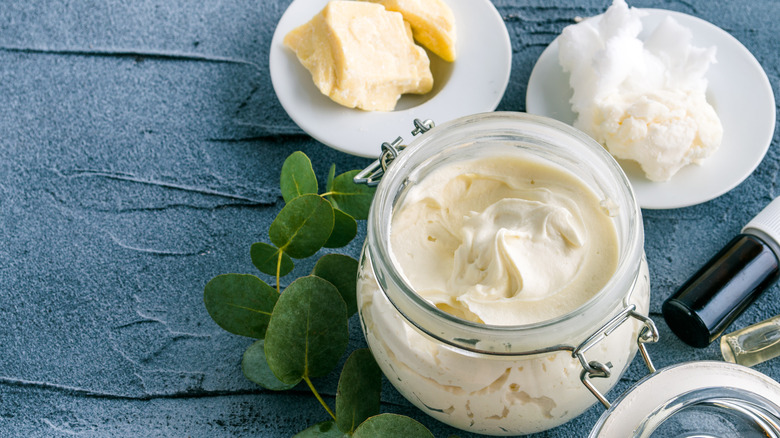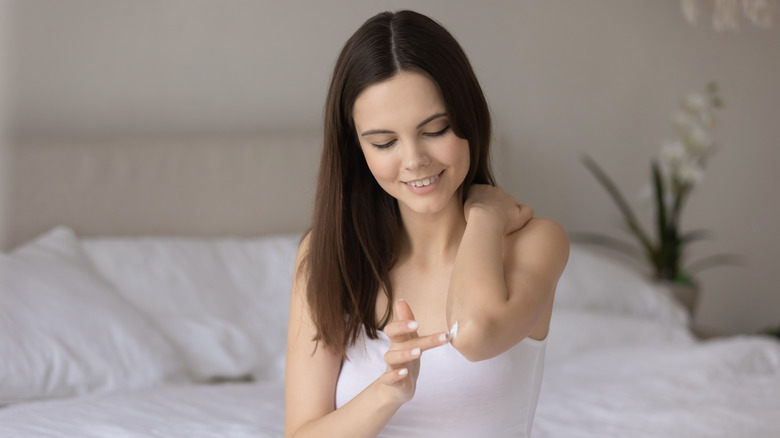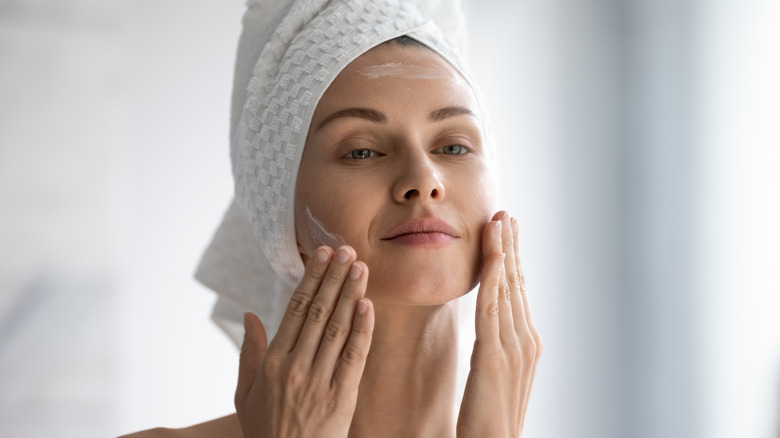What Is Murumuru Butter And What Does It Do For Your Skin?
Murumuru butter is widely used in shampoos, facial creams, soap bars, and other beauty products. Manufacturers claim that it improves skin elasticity and retains moisture. Lush says that it boasts anti-inflammatory and anti-microbial properties due to its high content of fatty acids. Beauty bloggers swear by it for thicker, stronger hair and youthful skin. But can you really trust these claims?
First things first, you should know that murumuru butter comes from the seeds of the Astrocaryum murumuru palm tree. Cosmetics manufacturers have been using it in vegetable creams and soaps since the 1940s, according to Annmarie Skin Care. Lauric acid, one of its primary compounds, fights inflammation and bacterial infections. Myristic acid, on the other hand, may protect against oxidative stress.
This yellowish fat is said to soothe sensitive skin and lock in moisture. Proponents claim that it also nourishes the scalp, leading to healthy hair. On top of that, it's odorless and has a long shelf life. Some say that it's just as good as or even better than coconut oil. Let's take a closer look at its potential benefits!
Murumuru butter moisturizes your skin and reduces the signs of aging
Rich in fatty acids, murumuru butter moisturizes your skin without leaving it feeling greasy. Its fatty acid profile is similar to that of cocoa butter, notes Healthline. Lauric acid, myristic acid, and other compounds in murumuru butter are highly nourishing, sealing moisture into the outer layers of your skin.
This natural ingredient is about 46% lauric acid and nearly 30% myristic acid, explains Annmarie Skin Care. When applied topically, these fats can help restore your skin's moisture barrier. Coconut oil is rich in lauric acid, too, but it tends to clog the pores and may trigger or worsen acne, dermatologist Dr. Luigi L. Polla told Harper's Bazaar. Murumuru butter is less comedogenic, but it should be used with caution on acne-prone skin.
Vitamins A and E, which occur naturally in murumuru butter, may slow down aging. Harvard Medical School states that topical vitamin A boosts collagen production, leading to fewer wrinkles and fine lines. Vitamin E, on the other hand, protects your skin from oxidative stress and ultraviolet (UV) radiation. At the same time, it reduces inflammation and speeds up wound healing, according to the Linus Pauling Institute.
Apply murumuru butter on dry or sensitive skin to soothe irritation
Due to its high fat content, murumuru butter isn't the best choice for acne-prone skin. However, it can be a great option for dry and sensitive skin, explains Healthline. People with sensitive skin have lower levels of sebum, ceramides, fatty acids, and other epidermal surface lipids, which may cause localized pain and discomfort. Murumuru butter acts as an emollient and may help improve the skin's barrier function. With regular use, it can restore skin elasticity (via Cinta Aveda Institute).
This fatty ingredient may also relieve eczema symptoms, suggests Healthline. Coconut oil, which has a similar composition, has been shown to reduce inflammation and enhance skin barrier function (via the Journal of Traditional and Contemporary Medicine). Therefore, it may benefit people with eczema and other skin conditions. Murumuru butter could have similar effects, but more research is needed to confirm it.
Note that murumuru butter is often combined with other ingredients in beauty products. Facial creams, for example, may also contain fragrances or exfoliants. These compounds can trigger allergic reactions or irritate your skin, warns dermatologist Marisa Garshick (via Byrdie). That's why you should always read the labels and perform a patch test before using any new products. Depending on your skin type, you may use murumuru butter along with cocoa butter, vitamin E, hyaluronic acid, and other natural ingredients. To fully reap its benefits, apply it after a warm shower when your pores are open.


